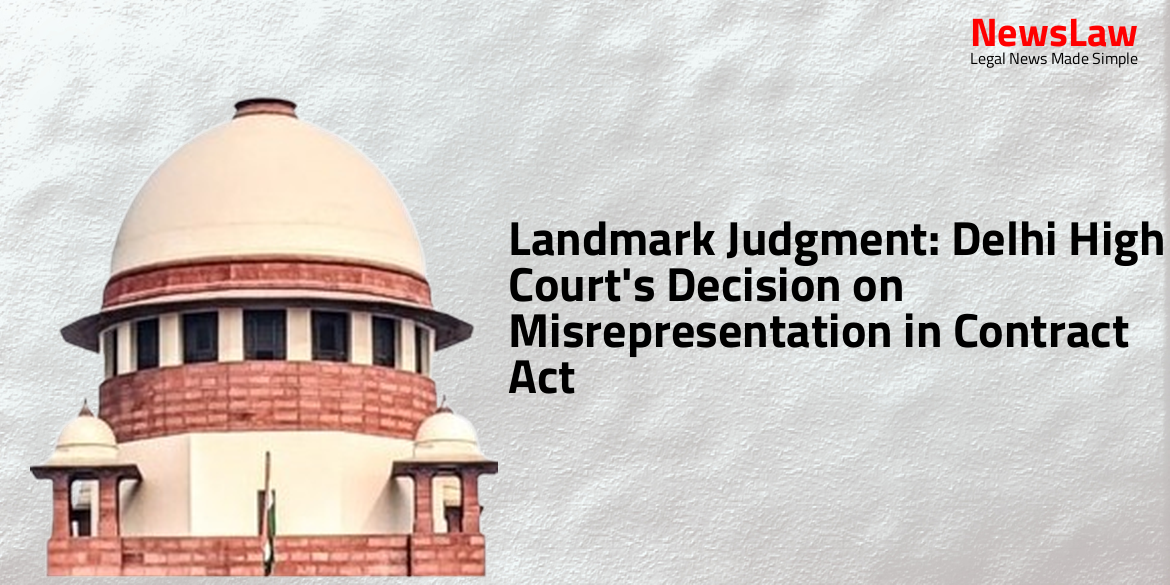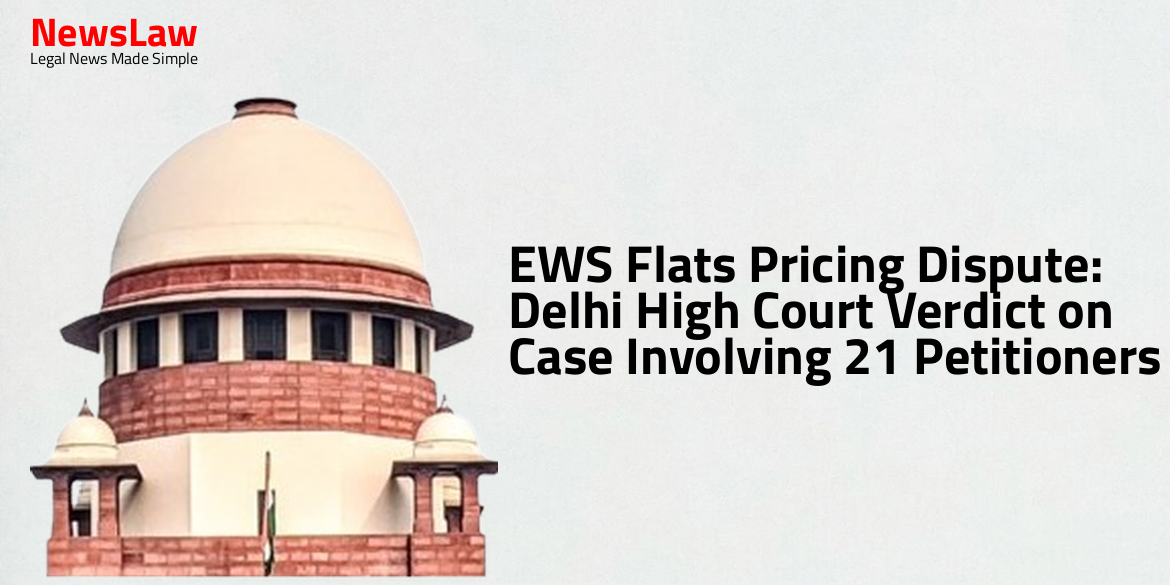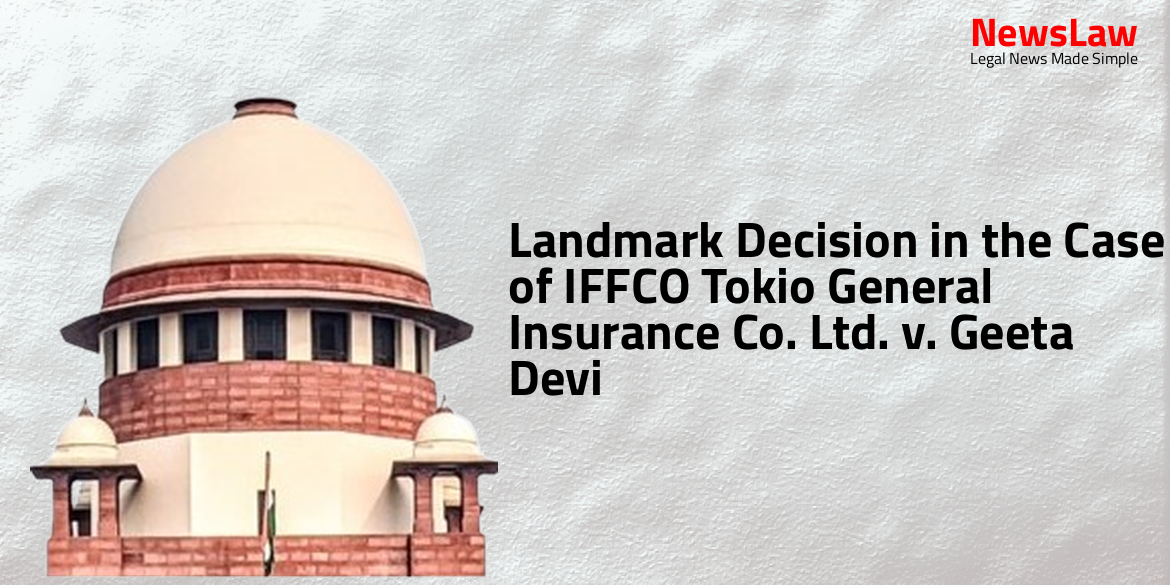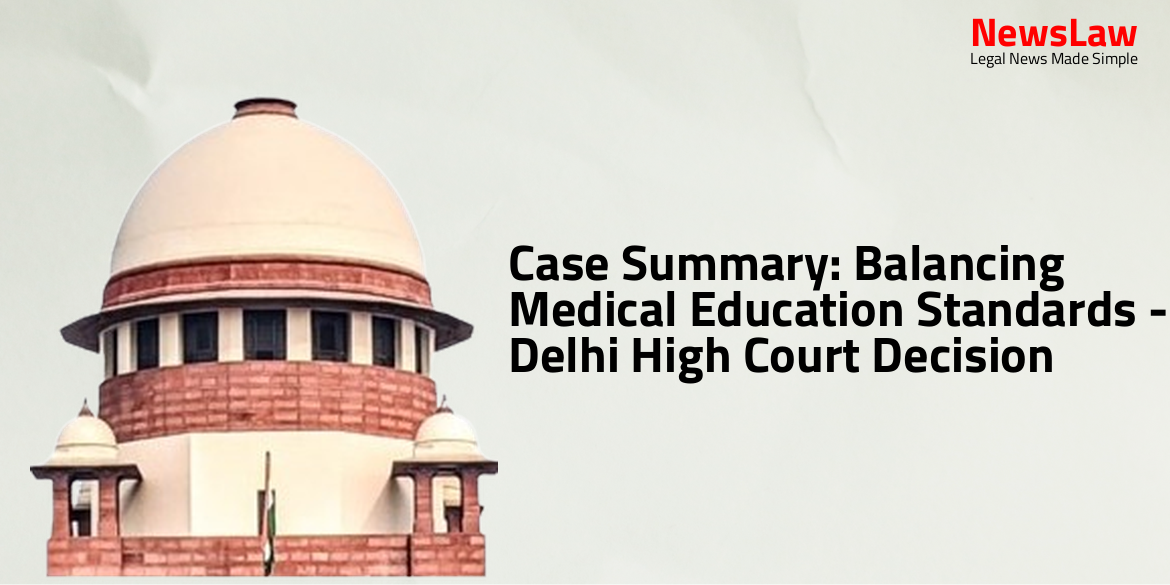In a groundbreaking case heard by the Delhi High Court, a crucial decision was made regarding fraudulent misrepresentation in the Contract Act. The court analyzed the details of the case brought forth by the parties and assessed the validity of the claims made in relation to the agreement in question. Stay tuned to explore the implications of this judgment on contract law practices.
Facts
- NHAI failed to act in a transparent, reasonable, and bona fide manner at the time of entering into the Agreement.
- The Arbitral Award directed NHAI to refund illegally forfeited performance security along with interest and to pay excess amount received above actual toll collection to Sangam with interest.
- NHAI’s initiation of the tender process for toll collection on an incomplete stretch showed lack of bona fides.
- The Arbitral Award highlighted serious disputes in toll collection and lack of disclosure regarding the incomplete Kalpi Stretch and closure of the old Yamuna Bridge.
- The Learned Single Judge set aside the Arbitral Award, stating that the Contract should not be considered voidable at Sangam’s option as the information was readily discoverable with ordinary diligence.
- NHAI’s termination and blacklisting of Sangam, forfeiture of security, and excessive payments were deemed illegal and were directed to be refunded with interest.
- NHAI appointed a Sole Arbitrator on 03.07.2013.
- Sangam claimed monies for losses and refund of security under the Agreement.
- Sangam contended the Agreement was void due to misrepresentations by NHAI regarding the Kalpi Stretch.
- Sangam challenged the rejection of their Section 17 Arbitration Act application in a Section 34 Petition, which was dismissed on 26.08.2013.
- NHAI reduced annuity payment due to incomplete Kalpi stretch.
- NHAI terminated the Agreement and forfeited performance security on 24.10.2013.
- NHAI sent a show cause notice to Sangam on 09.07.2013.
- The Agreement term was from 09.03.2013 to 09.03.2015.
- NHAI accepted Sangam’s bid for toll collection in the sum of Rs.62.10 crores.
- Arbitral proceedings revealed disputes over incomplete road conditions and traffic congestion.
- NHAI filed a counterclaim for non-payment of toll fees and losses.
- Sangam provided a bank guarantee and performance security for the Agreement.
- NHAI debarred Sangam from future projects for two years through a communication on 30.10.2013.
- Sangam invoked Arbitration on 30.05.2013.
- NHAI was allowed to reduce deposits due to incomplete Kalpi stretch according to a Notification from the Government.
- Sangam requested NHAI to complete the Kalpi stretch to avoid termination of the Agreement.
- NHAI directed Sangam to calculate remittance based on the incomplete stretch.
- NHAI was authorized to collect toll fees before and after the completion of the Kalpi stretch on NH-2.
Issue
- Whether the Exception to Section 19 of the Contract Act allows the Agreement to not be voidable is the main issue.
- The Single Judge’s conclusion that the Agreement is not voidable due to the Exception is being scrutinized.
- The key controversy is the validity of the Exception in this specific case.
Arguments
- NHAI challenged the rejection of its contentions and Sangam’s claims allowed by the Arbitral Tribunal.
- NHAI contended that there was no misrepresentation as the Kalpi Stretch was not hidden, and Sangam had acquiesced to this fact.
- NHAI argued that the Exception to Section 19 of the Contract Act does not apply in cases of active concealment and fraudulent misrepresentation.
- NHAI relied on judgments to support the limited interference in an Arbitral Award under Section 34 of the Arbitration Act.
- NHAI emphasized that arguments on questions of law can be raised at any stage of the proceedings.
- NHAI pointed out that Sangam raised objections about the Kalpi Stretch and misrepresentation only after a termination notice was sent.
- NHAI further contended that the Kalpi Stretch’s incompleteness was known to Sangam and should have been considered during the bid submission.
- NHAI argued against the findings of misrepresentation, stating that Sangam’s over-ambitious bid led to financial difficulties with the project.
- NHAI contended that the defendants made written communications providing a fictitiously high value to the property.
- The learned Single Judge correctly set aside the Arbitral Award based on the representation made by the defendants.
Analysis
- The learned Single Judge had erroneously concluded that the Agreement would not be voidable by virtue of Exception to Section 19 of the Contract Act.
- Cases of deliberate fraud do not fall under the Exception to Section 19, and contracts procured by fraud are voidable.
- The plea of misrepresentation by Sangam after the bid submission is barred by acquiescence and waiver.
- The defendant’s false representations were made to deceive and induce a higher property value in the sale agreement.
- The letters with bogus offers were fraudulently created to inflate the property value, leading Sangam to enter the agreement.
- The contract was procured by fraud, and thus should be rescinded as per the court’s decision.
- NHAI did not challenge the factual findings of the Arbitral Tribunal regarding the misrepresentations.
- NHAI’s contention that there was no misrepresentation or fraud played is refuted.
- The Exception to Section 19 does not apply in cases of active concealment or deliberate misrepresentation.
- A false representation is irrelevant if it did not induce the party to enter into a contract.
- Mere silence is not fraud unless there is a duty to disclose or the silence itself is equivalent to speech
- Fraud includes acts like suggesting false facts, actively concealing facts, making a promise with no intention to fulfill it, any act meant to deceive, or any act specifically declared as fraudulent by law
- Misrepresentation involves positively asserting something false believed to be true, breaching duty to deceive and gain an advantage, or innocently causing a mistake in the agreement
- Agreements are voidable if consent is caused by coercion, fraud, or misrepresentation
- Consent caused by misrepresentation or silence can make a contract voidable, unless the party could have discovered the truth with ordinary diligence
- Fraud or misrepresentation that does not cause consent does not render the contract voidable
- Cases of deliberate active fraud fall under Section 19 of the Contract Act and not under its Exception.
- The Exception to Section 19 does not apply to cases of active fraud as distinguished from non-fraudulent misrepresentation.
- The Supreme Court held that contracts obtained through fraudulent inducement under Section 17 are voidable.
- The court emphasized that fraudulent inducements to contracts are voidable at the option of the deceived party.
- Contracts obtained through coercion, fraud, or misrepresentation are voidable at the option of the deceived party according to Section 19.
- For cases of deliberate active fraud falling under section 19, the Exception does not apply.
- The court clarified that fraud in the performance of a contract may lead to damages but not rescission of the contract itself.
- Fraudulent misrepresentation, especially in inducing investment, can render a contract voidable.
- The judiciary’s interpretation of fraud in contract law focuses on inducements and misrepresentations affecting the formation of contracts.
- The court does not agree with the conclusion that findings are not required to be adjudicated upon due to the Exception to Section 19 of the Contract Act.
- NHAI challenged all findings against it and the dismissal of its counter claim in the Petition under Section 34 of the Arbitration Act.
- Adjudication on these findings of fact was deemed necessary to be carried out.
- The matter is remanded for a fresh adjudication of the Section 34 Petition by the learned Single Judge.
Decision
- All rights and contentions of the parties are left open.
- The Appeal and pending application are disposed of with the stated terms.
Case Title: SANGAM (INDIA) LTD Vs. THE NATIONAL HIGHWAY AUTHORITY OF INDIA & ANR (2024:DHC:3971-DB)
Case Number: FAO(OS) (COMM)-287/2019



